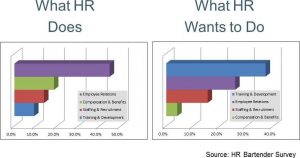Over the past couple of months, you guys have graciously answered a couple of surveys about what HR currently does and what HR wants to do. I thought you might find it interesting to see the two sets of survey results side by side. The results are very interesting.
Let’s start with the disclaimer: this is not a scientific survey. It’s only reflective of the people who responded, but it does confirm some of the trends we’ve been talking and reading about.
How are HR pros spending their time? Here’s what the graph tells me.
- Employees continue to be frustrated and disengaged. Is that why human resources is spending a whole bunch of time on employee relations?
- Companies are watching their pennies. Are HR pros spending time on compensation and benefits to save their organizations money?
- Not so much recruiting taking place.
- And training and development … well, the graph speaks for itself.
On the other hand, what would HR like to be working on?
- A study from Forrester Research shows that investments in training and development increase employee productivity, which ultimately has a positive impact on the bottom line.
- It only seems logical that companies who are providing employees with training, are also sending the message that employees are important and valuable. This translates into better engagement.
- Productive employees create growth and profits. Companies need to hire more and this creates jobs. More recruiting occurs.
- Research from the Society for Human Resource Management supports that, while total compensation might attract employees, companies retain talent through employee development.
Did I miss something here? What do you think when you see these stats? It seems to me there’s no downside to investing in your current employees – which is what the majority of people say they want to do. Isn’t there some old cliché about lifting everyone up?! If not, there should be.
And more importantly, if training leads to increased productivity and better productivity puts people back to work, how do we move from here to there?








Michelle Rand says
I found your results very interesting. One thing I have experienced, is not only do we need to invest in training & development, but we also need to invest in re-evaluating the psychological contract between the company and the employee. Employees are feeling the crunch of doing more with less – this is not new – but what is new is they’ve seen year over year their loyalty to the company doesn’t go both ways. If this isn’t addressed – educating employees and helping them through the new assumptions on company-employee relationships – you could have all the development resources out there – but the employees won’t want to take advantage of them.
monica says
I actually was wanting to see the final compared result. Thanks a ton. Great read.
Natalie says
Hi Sharlyn,
What great polls. Here in the UK there seems to be a sea-change. Savvy HR professionals are now getting smarter at using HR software to automate payroll, appraisals, map out talent management, identify talent gaps, put in self-service HR and outsource employee relations. We have numerous examples of how HR is saving cost long term and demonstrating ROI by investing upfront in technology in the short term. This also frees up time for HR professionals to look at how they can drive more profit by motivating their employees (employee engagement).
I see a massive shift where HR is now looking at ways in which to empower each individual so that every employee takes much more control of their own career development. HR has more of a role to play in creating a coaching/mentoring culture where they train managers up to have honest, open conversations about what kind of personal development, training and support each member of their team needs from the business.
Some of the key questions various HR experts are now asking themselves more than ever: What would it take for me to build a high performance culture? How can I help all employees find meaning and purpose within their role and align their own personal values to that of the organisation? How can I build community into my organisation to create an inspiring, inclusive company culture that everyone wants to be a part. What can I do to reduce stress and burnout? Those HR professionals who are addressing these issues are finding a more highly engaging, productive and motivated workforce where employees are driving innovation and being more creative to grow business without leaders having to necessarily put more money in the pot.
Sharlyn Lauby says
@Michelle – I couldn’t agree more. The whole nature of work is changing and we have to change with it. It’s interesting to hear the mention of loyalty. I learned a long time ago that the company is not going to pay my mortgage, so I better not make assumptions where loyalty is concerned. Thanks for the comment!
@Monica – Thanks for the comment. I’ve been wanting to share for a while. But also wanted to give people time to take the poll.
@Natalie – Thanks for sharing. Terrific points! I agree that technology is really freeing up our time to work on other projects within the organization. I believe having employees play an active role in their own professional development is key. But we also need to offer employees guidance on how to identify and evaluate themselves. What’s that old saying? –“you don’t know what you don’t know.”
Klara says
the situations and goals you described, are from an ideal situation. (or maybe your lucky) here in my country (east-germany), the most members of the HR scene are not qualified. Explicit the multinational companies, who cannot afford to employ any amateurs. but IRL, there are so many incompetent persons. maybe they should read your blog, too:)
Mike Henry Sr. says
Interesting comparison Sharlyn. Thanks for sharing. This seems like another version of the knowing-doing gap. I agree with you the question seems to be in the move from here to there. I’m interested in how HR people propose solving the problem. It’s tempting to think that the employees or the economic downturn or tough times or stingy executives are the problem.
For example, are their self-development initiatives that could be employed more? Can compensation and benefits be tied to individual self-development? Can collaboration and dialog be introduced as ways to develop people more within the organization?
As a non-HR person who didn’t respond to the survey, I don’t claim to have the answers. I’m interested though in hearing more suggestions for how to make training and development something driven more by individuals than by organizations.
Thanks, Mike…
Sharlyn Lauby says
@Klara – Point well taken. HR is still evolving as a formal discipline. I’m one of those who got the job then went back and took classes to learn more. That’s why it’s important to teach people how to evaluate their own performance and identify ways to develop personal competencies. Thanks for the comment!
@Mike – Thanks for sharing. I believe organizations should use training and development as a way to teach the principles of self-management. This creates a ‘win-win’ because employees now know how to manage themselves including problem solving and learning styles.
It seems to me the only way to change the cycle is to teach employees how to develop themselves. That doesn’t currently happen in our education system, so if business takes the lead, they win in the long run.